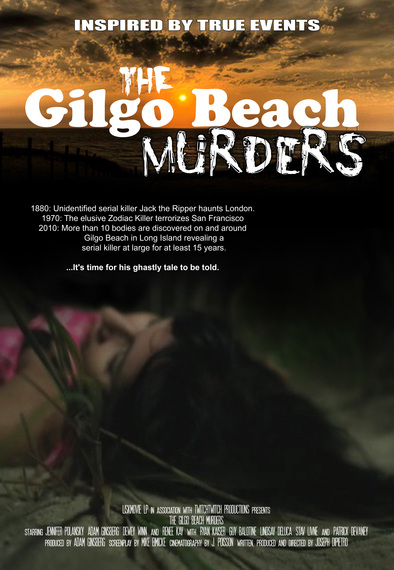A Craiglist escort goes missing. She was last seen screaming and running from a john's house along Oak Beach in Long Island. When police recover the escort's body, (her death was accidental, brought on by a panic attack) they inadvertently stumble upon the burial grounds of a killer murdering women just like the escort they'd been searching for. Nested in the dunes are the remains of 10 other people, including women with the same profile as the missing escort. Family members of identified victims report a series of taunting phone calls made from disposable cell phones. Police suspect these calls to have come from the killer. This was back in December, 2010, when police began to investigate the Gilgo Beach killer.
Three years later, no arrests have been made and the case remains unsolved.
But the story of lost girls, prostitutes and runaways, now compels our attention as the subject matter of a new film, The Gilgo Beach Murders.
When it comes to horror, we like it ripped from the headlines, or so suggests the rise in popularity of true-crime thrillers. "Abduction, rape, murder, these are true horrors of life, and we need look no further than local news reports to find them," explains actress Kelly Rae LeGault, who plays an "Interviewed Streetwalker" in The Gilgo Beach Murders. From Truman Capote to the team of writers at SVU, storytellers have captured our attention by re-imagining real life stories of sociopathy.
There are many reasons for this. One is that good true-crime storytelling does what art, film and literature does, in that it makes us question our collective cultural morality. In this vein, he first film about the 2010 discovery of a serial killer still at large on Long Island, premieres at Manhattan's Anthology Film Archives on Tuesday, November 12, 2013. An independent feature directed by Joseph DiPietro, who co-wrote the screenplay with Michael Eimicke and co-produced the film with Adam Ginsberg, The Gilgo Beach Murders is a compelling thriller about unsolved murder, the underside of the Internet, and the compulsive nature of guarding secrets. Says DiPietro, "My film is about people. It deals with killers and prostitutes; drug dealers and businessmen; people who are struggling and those who love them; cheaters and manipulators; the caring and compassionate." It's also the story of a sophisticated serial killer who murdered four prostitutes, possibly others, dismembered their bodies, dumped them in heavy underbrush along a beachfront causeway on Gilgo Beach, and has been evading police capture for at least a decade.
But rather than concentrate on the psychic mechanisms of a killer, who in the film is played by Ginsberg, DiPietro explores the lost girls, also known as the killer's victims. Yes, the lost girl (or girls) is a trope itself. And just as the killer is a projection of our most behemoth fears, the victim too (and in this case a female involved in sex work) is a target for the fantasies we project upon her.
DiPietro admits he "stayed away from learning too much about the victims, as I wanted to create my own story and not exploit or harm the families of the actual victims any further. The movie is a work of fiction inspired by actual events along the lines of River's Edge and Henry: Portrait of a Serial Killer two films inspired by true life cases (the cases of Anthony Broussard and Marcy Conrad, and that of Henry Lee Lucas and Otis Toole, respectively). This is not a documentary presenting facts."
Actress Renee Kay's character was inspired by the missing escort who suffered a fatal panic attack -- the woman who coincidentally fell into a grave of murdered escorts, and whose death opened the investigation of a sensational unsolved crime. Kay says she was drawn to the project because DiPietro "created strong, dynamic female roles in his film. It wasn't just a cheesy horror movie that exploited women."
And Ginsberg, who plays the Gilgo Beach killer, approached the film with a particular sensitivity to the victims' families. "There is an unresolved case in my own family. Anything that can help to keep an unsolved crime highlighted, I believe is a good thing. It keeps the victims from being forgotten and hopefully helps in some way to get the case solved."
Still, "There is no way to make any kind of re-telling or re-enactment and not sensationalize it in some way," says Jennifer Mya Polansky who stars in the film as a college student turned-escort. "So, playing a woman who was the victim of a serial killer," she continues, "I feel like I'm giving her a chance to tell her story, to speak up for herself, even if my character's voice isn't the victim's voice per se."
LeGault too relied on the trope of the lost girl to inspire her performance. "I'm drawn to stories that have female characters in desperate situations, and characters I play often don't have names in the script. Instead they will have stock names: "Woman", "Wife", "Stripper", etc. I usually give a name to characters that fall into this category, but I didn't name her ["Interviewed Streetwalker"] I wanted her to feel lost and forgotten, the way she would have been in real life. "
One of the challenges of making true-crime dramas, especially those about sex crimes is, explains DiPietro, "The attacks from people who think I'm further victimizing the women." The incredibly dehumanizing term "throwaway" is often used to describe the lost girls or victims in crimes that nobody notices, until that is, there's a film about them.

